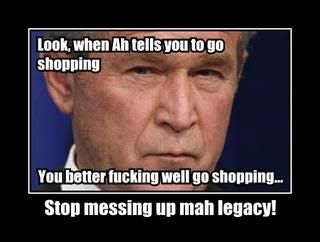WASHINGTON - The nation's unemployment rate jumped to 5.5 percent in May — the biggest monthly rise since 1986 — as nervous employers cut 49,000 jobs.Financial institutions?
The latest snapshot of business conditions showed a deeply troubled economy, with dwindling job opportunities in a time of continuing hardship in the housing, credit and financial sectors.
"It was ugly," said Richard Yamarone, economist at Argus Research.
With employers worried about a sharp slowdown and their own prospects, they clamped down on hiring in May, said Friday's report from the Labor Department. The unemployment rate soared from 5 percent in April to 5.5 percent in May. That was the biggest one-month jump in the rate since February 1986. The increase left the jobless rate at its highest since October 2004.
And:Federal regulators warned Thursday that banking-industry turmoil would continue as financial institutions come to terms with piles of bad loans they made to finance the construction of homes and condominiums.
Until now, most of the damage to banks from the housing crisis has come from homeowners defaulting on their mortgages. But amid a dismal spring sales season for new homes, loans to home and condo builders are looking increasingly shaky. Banks have begun to dump them at what will likely be steep discounts, setting the stage for billions of dollars in fresh losses.
"As long as the housing market is on a downward path, as long as those prices continue to fall, I think there's a risk that the losses could continue to mount on a variety of loans," Federal Reserve Vice Chairman Donald Kohn told the Senate Banking Committee Thursday.
WASHINGTON (Reuters) - Future U.S. bank failures linked to the downturn in the real estate market may include "institutions of greater size" than in the recent past, Federal Deposit Insurance Corp Chairman Sheila Bair said on Thursday.Oil?: (my bold)
In testimony prepared for a Senate Banking Committee hearing on the state of the banking industry, Bair said an increasing number of problem banks face high exposure to commercial real estate and construction lending."There is also the possibility that future failures could include institutions of greater size than we have seen in the recent past," Bair said. "Uncertainties in today's economic environment continue to pose significant challenges for the banking industry, households, and bank regulators."
The FDIC, which has about $52.8 billion in its deposit insurance fund, has launched a review of its risk-assessment rates for larger banks to determine if they reflect current conditions, she said.
NEW YORK - Oil prices shot up nearly $7 a barrel Friday, extending big gains from the previous day and racing toward an all-time high after a Morgan Stanley analyst predicted prices could hit $150 by the Fourth of July.Consumer confidence?:Light, sweet crude for July delivery jumped $6.27 to $134.06 on the New York Mercantile Exchange. Earlier, the contract rose as high as $134.68.
Friday's surge builds on a $5.49 gain Thursday, which was the biggest single-day price increase in the history of the Nymex crude contract. That spike came as the dollar fell in response to comments by the European Central Bank suggesting the bank could raise interest rates.
Prices pushed sharply higher Friday after Morgan Stanley analyst Ole Slorer said he expected strong demand in Asia that could drive prices to $150 by July 4.
WASHINGTON (Reuters) - U.S. consumers are socking more money into savings, as fears of a weakening economy may be making them reluctant to spend their tax rebate checks, according to analysts who say that may mean the economy faces a prolonged period of slower growth.Bush's legacy. We didn't go shopping when he told us to.
In fact, consumers have been slowly rebuilding savings since hitting a low point in November 2007, when they drew down savings in order to keep spending. Since November's negative 0.1
percent savings rate, it has slowly climbed to reach 0.7 percent of disposable income in April.
[snip]
As of last Friday, the U.S. Treasury had mailed out tax rebate checks of up to $600 for individuals and $1,200 for couples, worth a total of $50.041 billion. The rebates are part of a $152 billion stimulus program signed into law in February by President George W. Bush aimed at giving the flagging economy a quick lift.CONSUMERS JITTERY
Economists, however, think much of the money will be directed by jittery consumers toward reducing existing debts, instead of more spending on goods and services.
"If people are looking ahead to next winter and thinking how much it is going to take to fill up the heating oil tank ... it is not going to help the economy in the short run," said Gary Thayer, senior economist for Wachovia Securities.
There is evidence people are shopping less. Last week's personal income report showed that spending rose a meager 0.2 percent in April after a 0.4 percent gain in March.
And a Reuters/University of Michigan Survey of Consumers data showed consumer confidence in May dropped to its lowest level in 28 years, a signal that consumers are not about to open their wallets easily.

2 comments:
oi.
More like eep? Ack! AaaaAAAAaAaaA grgahdkadkahd....
Post a Comment